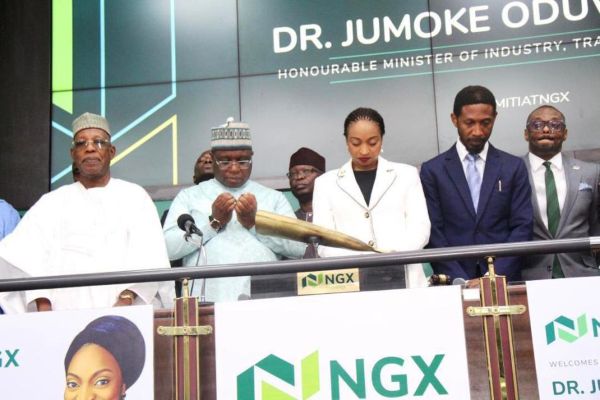
In a bold move to re-energise Nigeria’s investment climate and industrial base, the Federal Ministry of Industry, Trade and Investment (FMITI) has entered into a strategic partnership with the Nigerian Exchange Group (NGX Group) to mobilise $6 billion in investment inflows into the country’s productive sectors by the end of 2025.
The announcement was made during a Closing Gong Ceremony at the NGX in Lagos, attended by Minister of Industry, Trade and Investment, Dr. Jumoke Oduwole, and top executives of the Exchange. The event signalled more than a ceremonial closing of the trading day—it marked the unveiling of a coordinated capital markets–industrial policy strategy aimed at repositioning Nigeria as a compelling destination for both Foreign Direct Investment (FDI) and Foreign Portfolio Investment (FPI).
Breaking Down the $6 Billion Ambition: FDI + FPI = Growth Multiplier
According to Dr. Oduwole, $3 billion of the targeted inflows will come from FDI into strategic real sectors—including infrastructure, manufacturing, agribusiness, technology, and renewable energy. These sectors are central to job creation, non-oil export expansion, and boosting domestic production capacity—an urgent imperative in a post-oil economy.
The other $3 billion will be sourced through FPI, leveraging innovative financial instruments such as green bonds, diaspora-linked securities, and SME-focused capital platforms. This approach not only aims to deepen market liquidity but also aligns with global investor appetite for sustainable and impact-led opportunities.
“Deepening Nigeria’s capital markets is fundamental to improving investment flows, creating jobs, and sustaining long-term economic resilience,” said Dr. Oduwole, reinforcing the ministry’s dual-track approach of economic reform and capital mobilisation.
Capital Markets as Catalysts: NGX Group’s Role in the Vision
The partnership underscores the increasing convergence between policy direction and capital market innovation. NGX Group, under the leadership of Chairman Ahonsi Unuigbe and Group CEO Temi Popoola, has repositioned itself as a central platform for driving inclusive investment, capital access, and economic transformation.
“Capital markets are powerful engines of innovation, business expansion and economic inclusion—core to our industrialisation journey,” said Unuigbe.
Popoola added that NGX Group is deploying next-generation digital infrastructure to democratise access to investment opportunities, unlock liquidity, and attract global and local capital into Nigeria’s economy.
BRANDECONOMY INSIGHT: Why This Partnership Is Different
This is not the first time Nigeria has spoken about attracting capital. But what makes the FMITI–NGX partnership noteworthy is the clear investment architecture laid out. Rather than relying solely on extractive sector inflows, the government is now looking to market-based instruments and structured incentives to diversify funding sources to achieve the $6 Billion Investment target.
Key levers for execution include:
- Strategic Listing of State-Owned Enterprises (SOEs): Potentially unlocking billions through partial privatisations or capital market entries.
- Empowering SMEs via Listing Platforms: Helping small businesses tap growth capital, especially in the agritech, logistics, and manufacturing value chains.
- Green & Sustainable Finance: Tapping into global ESG-driven liquidity to finance clean energy, waste-to-wealth, and climate-smart infrastructure.
The collaboration also reflects the maturing of Nigeria’s capital markets from a speculative trading platform to a development-focused financial system, aligned with national goals such as job creation, industrial value-addition, and export expansion.
Ceremony with Substance: The Symbolism of the Gong
Dr. Oduwole’s appearance at the Closing Gong Ceremony on April 28 was symbolic—but not superficial. This ritual, traditionally reserved for high-level engagements, provided a platform for the minister to not only ring the bell but to ring in a new era of public-private synergy in national investment strategy.
It also served as a signal to the global investor community that Nigeria’s leadership is committed to market-led development, policy consistency, and investment protection—critical ingredients for building confidence amid macroeconomic headwinds.
BRANDECONOMY TAKEAWAY: Execution Will Be Key
With this ambitious $6 billion investment plan, FMITI and NGX have made a compelling case for how capital markets can become economic engines—not just trading floors. But success will depend on policy stability, regulatory coordination, investment facilitation, and credible implementation of reform promises.
In a year where Nigeria needs to rebuild global investor trust, this partnership could serve as a blueprint for how strategic alliances between government and capital markets can unlock sustainable economic value.












